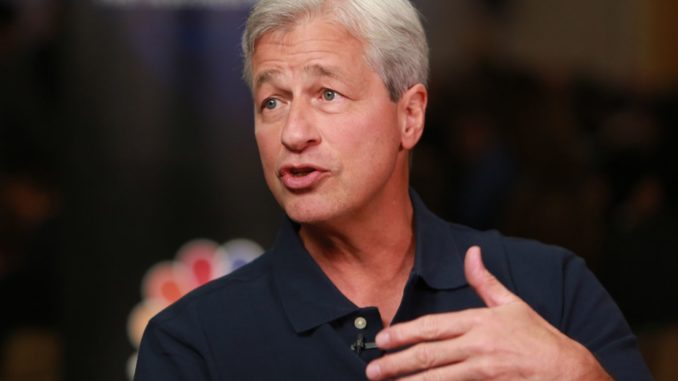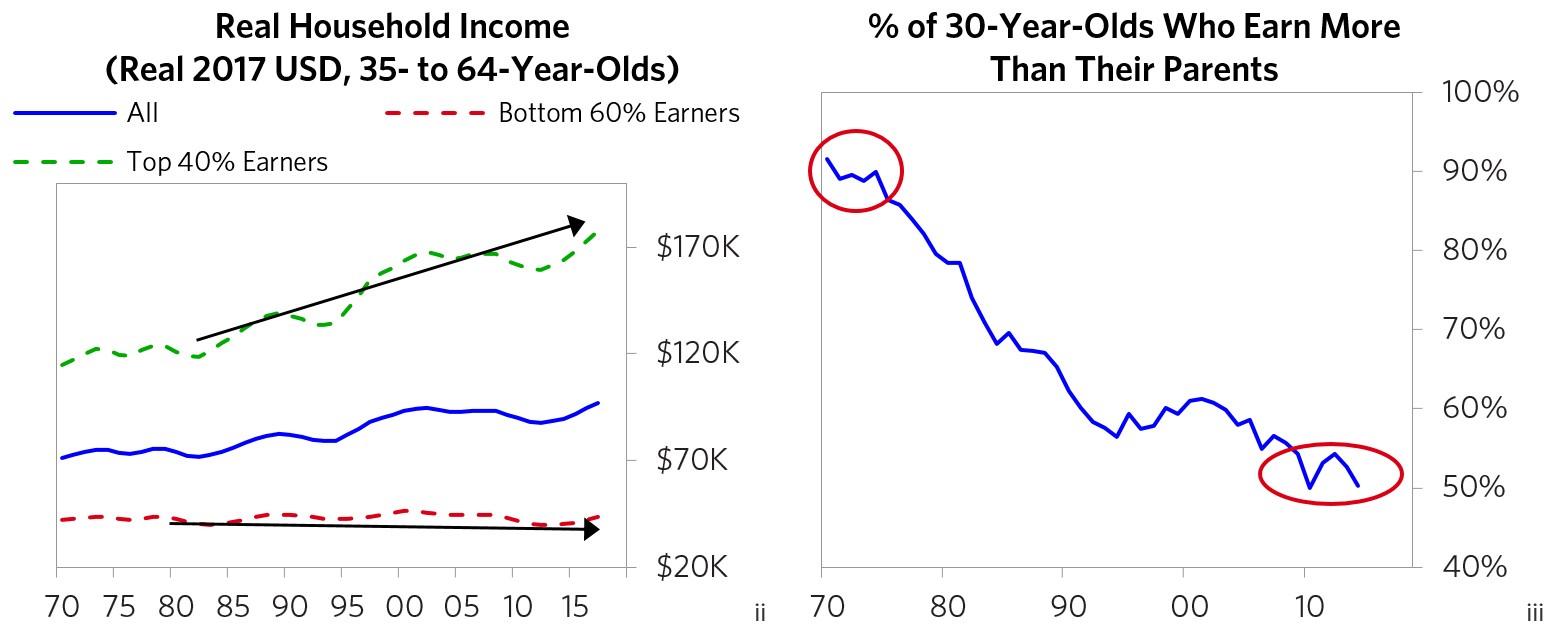
American billionaires are calling for changes to the system that enabled them to get rich.
Warren Buffett, Jamie Dimon, Ray Dalio, Bill Gates and a list of others say that capitalism in its current form simply doesn’t work for the rest of the United States. Some of their remedies involve higher taxes.
Hedge fund titan Ray Dalio is the most recent to criticize the current economic system. On Monday, the Bridgewater founder told CNBC that while it doesn’t need to be destroyed, capitalism does need to present an equal opportunity, which Dalio said he received through public education.
“I’m capitalist, I’m a professional capitalist. The system has worked for me,” Dalio said during a “Squawk Box ” interview on Monday. “I didn’t have anything and then I got something through the capitalist system.”
The issue chafing billionaires and politicians alike is a growing income gap.

WATCH NOWVIDEO24:46Watch CNBC’s full interview with Ray Dalio on reforming capitalism
The inequality between rich and poor Americans is as high as it was in late 1930s, Dalio pointed out in a paper posted online last week. The wealth of the top 1 percent of the population is now more than that of the bottom 90 percent of the population combined. Dalio called growing inequality and lack of investment in public education “an existential risk for the U.S.” He and his wife announced a $100 million to the state of Connecticut for public education this week.

Source: Bridgewater Associates
Among the fixes, Dalio floated raising “more from the top via taxes that would be engineered to not have disruptive effects on productivity.” He also advocated for public-private partnerships, and in a CBS “60 Minutes” interview that aired Sunday, supported raising taxes on the wealthy. But the important thing “is to take those tax dollars and make them productive,” Dalio told CBS.Dimon, Buffett, Gates
Jamie Dimon is also frustrated with the income gap. In a letter to shareholders last week, the J.P. Morgan Chase CEO outlined a list of problems plaguing the majority of Americans. Among the remedies, could be higher taxes on the 1 percent, he said.
“If that happens, the wealthy should remember that if we improve our society and our economy, then they, in effect, are among the main winners,” Dimon said.
Berkshire Hathaway CEO Warren Buffett — third on Forbe’s 2019 billionaires list — has repeatedly said the wealthy should be taxed more. In 2006, the CEO committed to give all of his Berkshire Hathaway stock to philanthropic foundations. He and Bill and Melinda Gates have asked hundreds of wealthy Americans to pledge at least 50 percent of their wealth to charity in the so-called “the Giving Pledge.” There are now 190 people signed on, including Facebook CEO Mark Zuckerberg and Netflix CEO Reed Hastings.
In a 2011 New York Times op-ed, titled “Stop Coddling the Super-Rich,” Buffett called for a tax increase on everyone making more than $1 million and an even bigger hike on Americans making more than $10 million or more. After the 2017 Republican tax plan was signed into law, Buffett told CNBC “I don’t think I need a tax cut.”
“The wealthy are definitely undertaxed relative to the general population,” he told CNBC’s Becky Quick during a February “Squawk Box” interview.
Gates, a close friend of Buffett and one spot above him on the Forbe’s list, has also called for higher taxes. Although the Microsoft founder said he’s paid more than $10 billion in taxes, “the government should require people in my position to pay significantly higher taxes.”
“There’s no doubt that as we raise taxes, we can have most of that additional money come from those who are better off,” Gates said during a conversationwith his wife Melinda and hundreds of high school students in New York City in February.

Jamie Dimon, chief executive officer of JPMorgan Chase & Co., left, speaks during a financial inclusion forum with Billionaire Bill Gates, chairman and founder of Microsoft Corp.Andrew Harrer | Bloomberg | Getty Images
Disney heiress Abigail Disney has pointed to ballooning CEO pay as part of the problem. Along with roughly 200 other New York millionaires, she asked state lawmakers to introduce a “millionaires tax” on those making more than $5 million to help fund affordable housing, infrastructure and other initiatives.
“If your CEO salary is at the 700, 600, 500 times your median workers’ pay, there is nobody on Earth, Jesus Christ himself isn’t worth 500 times his median workers’ pay,” she told CNBC earlier this year. The granddaughter of Roy Disney, co-founder of The Walt Disney Co. declined to comment on whether she thinks Disney CEO Bob Iger is paid too much.Capitalism vs. socialism
Washington is split on the issue.
Several Democrats, including presidential hopefuls and senators Elizabeth Warren and Bernie Sanders, are campaigning on higher taxes on the wealthy. Freshman Congresswoman Alexandria Ocasio-Cortez — a self-proclaimed Democratic Socialist — has called for a tax rate as high as 70 percent. The plan, laid out in a CBS “60 Minutes” interview with Anderson Cooper, has had no shortage of push back from corporate America. Former Federal Reserve chairman Alan Greenspan for one, called it “a terrible idea.”
The inequality issue has fueled a revival of the debate between the two economic systems. President Donald Trump and some Republicans have warned of consequences if Democrats and therefore left-leaning ideologies win next year’s presidential election. During his State of the Union address last month, Trump said, “We are alarmed by new calls to adopt socialism in our country” and that “we renew our resolve that America will never be a socialist country.”
In re-writing the tax code in 2017, the GOP lowered tax rates, which advocates said would juice the economy and result in a larger GDP to pay for them. Individual taxes for the most part came down, as well as those on American companies.
Lee Cooperman, who signed Buffett and Gates’s Giving Pledge, has been critical of the left’s current progressive tax policies. Earlier this year, Amazon scrapped plans to open its so-called HQ2 amid opposition surrounding $3 billion in incentives the city and state promised Amazon.
“What we have is a bunch of candidates running on the Democratic ticket that are left-leaning, and that’s, in my opinion, very counterproductive and destructive,” said Cooperman, who has signed The Giving Pledge, meaning he agreed to donate most of his wealth to charitable causes.
Cooperman has said he would be open to paying higher taxes if they were spent wisely.
Other billionaires also say they’d be fine paying more. Among those publicly amenable to higher rates: Pimco co-founder Bill Gross, Mark Cuban and Starbucks founder Howard Schultz, who Forbes estimates has a net worth of $3.7 billion. Schultz said he was considering a bid for the White House as an independent to address the “crisis of capitalism in this country.”
Even with higher taxes, Dimon, Dalio and others are hardly backing socialism. Dalio made it clear that his education initiatives require reform, not throwing capitalism out the window. In his 2019 letter to shareholders, released alongside the bank’s 2018 annual report, Dimon said “socialism inevitably produces stagnation, corruption and often worse.”
“This would be as much a disaster for our country as it has been in the other places it’s been tried,” Dimon said. “I am not an advocate for unregulated, unvarnished, free-for-all capitalism. (Few people I know are.) But we shouldn’t forget that true freedom and free enterprise (capitalism) are, at some point, inexorably linked.”
BY CNBC NEWS
